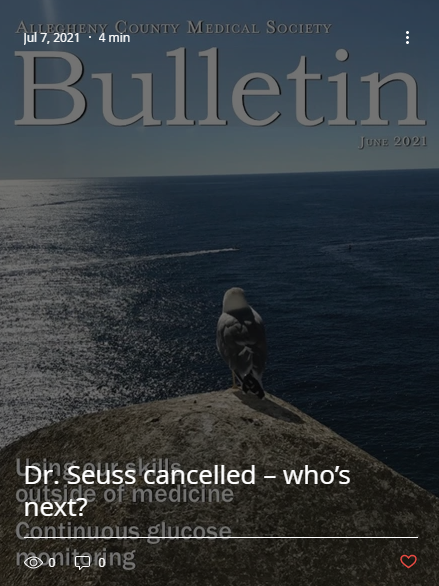
In a moment of cynical excess a few months ago, I speculated that Shakespeare and Dr. Seuss would be the next victims of the cancellation/bowdlerizing culture.
Then, like millions of parents and grandparents worldwide, I was shocked and disappointed when Dr. Seuss Enterprises announced that it would cease publication of six of his picture books because of depictions it now deems “hurtful and wrong.”
Geisel was not a physician, but added “doctor” to his middle name as his pen name and was a prominent figure on the Dartmouth campus as an undergraduate. (Full disclosure: my de facto godfather was his classmate, and I am a graduate of Dartmouth College and of its medical school.)
Some familiarity with the author’s illustrious career is useful in trying to understand his cancelling. Of the several books written about him, one of the best is Donald Pease’s “Theodor SEUSS Geisel.”
Geisel was the grandson of a German immigrant whose family was vilified by anti-German sentiment during and after World War I; Geisel, although not Jewish, was the target of anti-Semitism as an undergraduate. He was nevertheless named president of the Dartmouth humor magazine, the Jack-o-Lantern, which like similar publications from other Ivy League schools in the 1920s, was sold on newsstands in Boston and New York.
The poignancy of his undergraduate experience was reflected in many of his writings: Horton was the first name of a classmate, the Wah Hoo River was an abbreviation of the Dartmouth slogan “Wah Hoo Wah,” and “Oh the places you’ll go” a standard greeting followed by the response, “The people you’ll meet.” Many of the scenes and characters in his children’s books were drawn from his contributions to the Jack-o-Lantern.
His initial cartoons did not generate widespread interest until one, referring to an insecticide made by Standard Oil of New Jersey called Flit, attracted the attention of the wife of someone in Standard’s advertising division, leading to Geisel’s hiring. The slogan “Quick, Henry, the Flit!” became a catchphrase in popular American radio comedy and was used by Fred Allen and Jack Benny as a reliable one-liner. Geisel wrote ads for Standard Oil until 1938, and his salary provided needed financial security.
Although Geisel was an extraordinarily versatile and talented individual as a cartoonist, playwright, filmmaker and political cartoonist, he was known most conspicuously as an editor and illustrator of children’s books, which were ultimately translated into 15 languages and sold more than 200 million copies worldwide.
He wrote his first children’s book in 1937 and committed fully to children’s books in 1953. The impetus for the publication of “The Cat in the Hat” (1957) is fascinating as is its success. The director of Houghton Mifflin’s educational division of children’s books invited Geisel to write a primer of no more than 228 words. The objective was to produce a book that no first-grader could put down, and it succeeded beyond expectations, eclipsing many of the ineffective Dick and Jane readers then current. David Dempsey in the New York Times Book Review called it “The biggest thing that happened to the American classroom since the McGuffey’s reader in 1836,” and the New Yorker’s Ellen Maxwell opined that it was the “sort of book that children insist on taking to bed with them.”
He received two Oscars, two Emmys, a Peabody award and some eight honorary doctorates. He coined the word nerd, a major contribution to our current lexicon!
On the occasion of his 30th college reunion in 1955, he was awarded an honorary doctorate, along with Robert Frost. The citation for Geisel’s degree stated, “As author and artist you single-handedly have stood as St. George between a generation of exhausted parents and the demon-dragon of unexhausted children on a rainy day.”
The thought police subset among America’s tenured protestors has berry-picked a small number of illustrations from his juvenilia and wartime writings and accused him of being “steeped in racist propaganda.”
Some of the illustrations which they say offend would not be published today, but to offend is not equivalent to being offensive, nor to being racist. I doubt if these critics have read many of Dr. Seuss’ 39 books, and the scholarship that I have reviewed is superficial and larded up with irrelevant political comments.
Just prior to our entrance into World War II, 80% of Americans disapproved of going to war against Germany. After we entered the war, Geisel, then 39, entered military service and wrote for the Army, satirizing Hitler and Mussolini. Did the cartoons he drew during World War II depict Germans and Japanese in an unfavorable light? Of course they did. Yet in 1953, Japan adopted two of his books as part of its post-war elementary school curriculum. “A Chinese man who eats with sticks” was deemed xenophobic, yet I and most people I know use chopsticks when eating Chinese or Japanese food.
This man accused of racism endorsed anti-segregationist policies before they were popular, promoted workers’ rights and through Horton said, “A person’s a person no matter how small.” Horton’s maxims are a rhymed plea for minority rights, and “Yertle the Turtle” is critical of authoritarian rule.
An interesting parallel is a record called “The Investigator,” which sold 100,000 copies in the 1950s. It was a thinly disguised satire on the House Un-American Activities Committee and Sen. Joseph McCarthy. The author places McCarthy in heaven as chairman of a committee, which included Torquemada and Cotton Mather, tasked with determining who will stay in heaven and who will be sent to hell, the 1950s version of cancellation. Socrates, Voltaire, Milton and Thomas Jefferson are among those in the latter group. Lamentably, the author, Rueben Ship, was investigated by the House Un-American Activities Committee and deported to Canada while sick with osteomyelitis.
And yet some will relegate Dr. Seuss to the company of other canceled authors and works – Mark Twain, Harper Lee, Shakespeare. What is yet to come?

